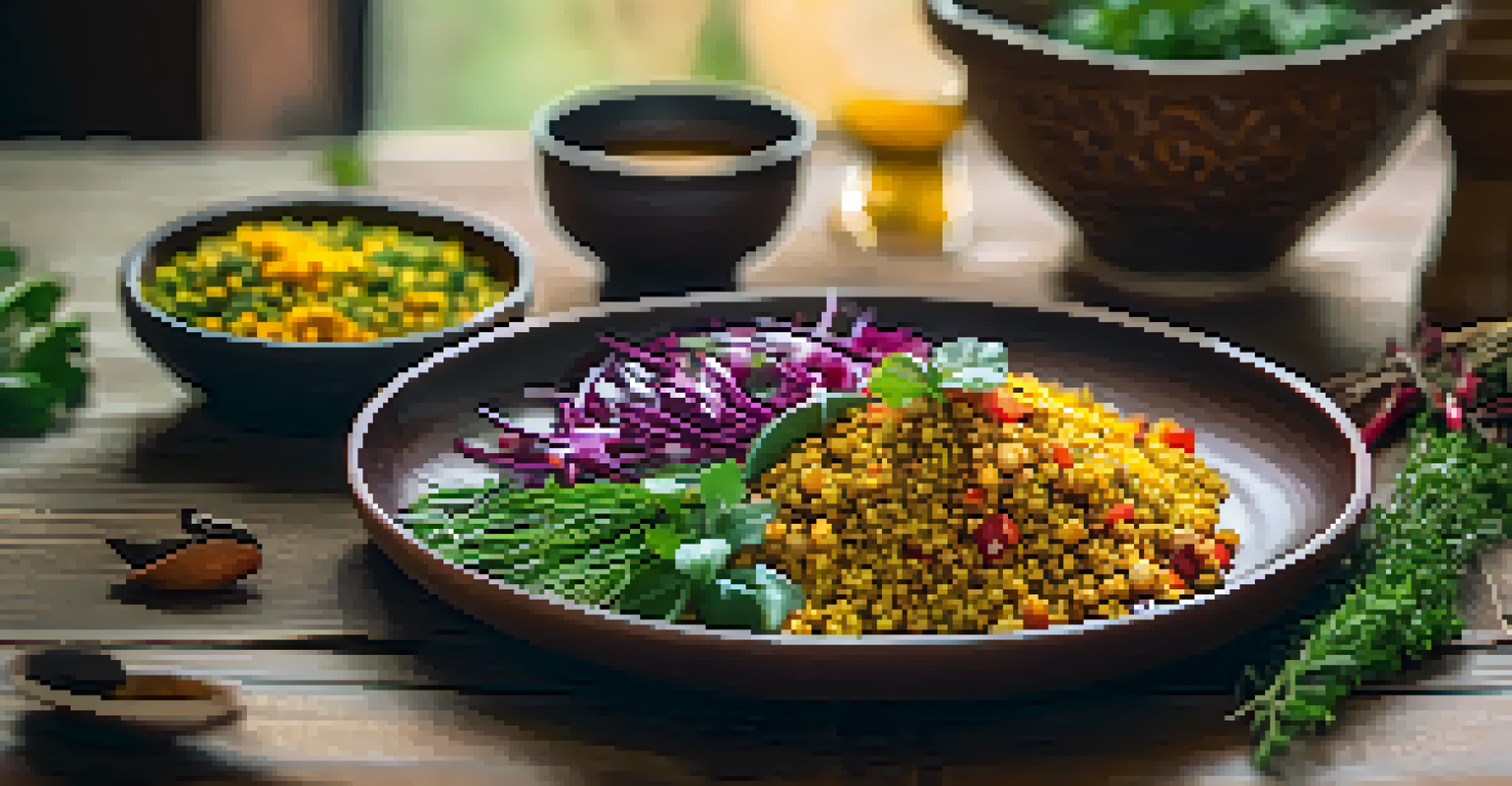Ayurvedic Diet: Enhancing Your Yoga Practice with Nutrition

Understanding Ayurveda: The Science of Life and Health
Ayurveda is a holistic healing system that originated in India over 3,000 years ago. It focuses on balancing the body's energies, known as doshas, to promote overall well-being. The three doshas—Vata, Pitta, and Kapha—are believed to influence physical, emotional, and mental health, and understanding them is key to optimizing your diet.
When diet is wrong, medicine is of no use. When diet is correct, medicine is of no need.
Incorporating Ayurvedic principles into your daily routine can be transformative, especially for those who practice yoga. By aligning your diet with your unique dosha, you can enhance your energy levels, improve digestion, and support mental clarity. This tailored approach allows for a more harmonious relationship between your body and mind, fostering deeper yoga practice.
For example, a Vata individual may benefit from warm, moist foods to balance their dry nature, while a Pitta person might thrive on cooling, light foods. By recognizing your dosha, you can create a personalized nutritional plan that complements your yoga journey.
The Connection Between Nutrition and Yoga Practice
Nutrition plays a crucial role in how well you perform during yoga sessions. Just like a car needs the right fuel to run smoothly, your body requires the appropriate nutrients to function optimally. The right foods can enhance your energy, flexibility, and focus, enabling you to get the most out of your practice.

Eating a balanced diet aligned with Ayurvedic principles not only nourishes the body but also calms the mind. Foods rich in whole grains, fresh fruits, and vegetables provide essential vitamins and minerals that support both physical and mental health. This holistic approach can help you maintain a sense of balance and peace on and off the mat.
Balance Your Dosha for Wellness
Understanding and aligning your diet with your unique dosha can enhance your overall well-being and support your yoga practice.
For instance, consuming a light meal of quinoa and steamed vegetables before a yoga session can offer sustained energy without the heaviness that might hinder your movements. By being mindful of what you eat, you can elevate your yoga experience and cultivate a deeper connection with your practice.
Choosing Foods That Support Your Dosha
One of the fundamental aspects of an Ayurvedic diet is selecting foods that align with your dosha. Each dosha has distinct characteristics that influence dietary needs, and understanding these can guide you in making better food choices. For example, Vata types might benefit from grounding foods like root vegetables, while Pitta individuals may prefer cooling fruits.
You are what you eat, so don’t be fast, cheap, easy, or fake.
To determine your dosha, consider factors like your physical traits, emotional tendencies, and even your digestion patterns. Once you identify your dominant dosha, you can explore a variety of foods that pacify imbalances. This personalized approach not only enhances your yoga practice but also promotes overall well-being.
Additionally, seasonal eating plays a vital role in Ayurveda. As the seasons change, so do the foods that can help balance your dosha. For instance, incorporating more warming spices in winter can aid digestion and boost immunity, while lighter, cooling foods in summer can help you stay refreshed and energized.
Incorporating Herbs and Spices into Your Diet
Herbs and spices are fundamental to an Ayurvedic diet and can greatly enhance your meals. Not only do they add flavor, but many also possess medicinal properties that support digestion, boost immunity, and promote overall health. Common Ayurvedic spices include turmeric, ginger, and cumin, each with unique benefits that can complement your yoga practice.
For example, turmeric is known for its anti-inflammatory properties, making it a great addition to your post-yoga recovery meals. Similarly, ginger can aid in digestion and soothe the stomach, which is particularly helpful after an intense yoga session. Incorporating these elements into your diet can create a more enriching and healthful experience.
Mindful Eating Enhances Digestion
Practicing mindful eating fosters a deeper connection with food, improving digestion and enriching your yoga experience.
Experimenting with different herbs and spices can also keep your meals exciting and varied. By creating flavorful dishes that align with Ayurvedic principles, you'll not only nourish your body but also cultivate a deeper appreciation for the foods that support your yoga journey.
Mindful Eating: Enhancing Your Connection to Food
Mindful eating is a practice that encourages you to be present during meals, fostering a deeper connection with the food you consume. This aligns seamlessly with the principles of Ayurveda, which emphasizes awareness and balance. By slowing down and savoring each bite, you can enhance your digestion and enjoy your meals more fully.
Practicing mindfulness during meals can also help you recognize hunger and fullness cues, leading to healthier eating habits. For example, instead of rushing through a meal, take a moment to appreciate the colors, textures, and flavors of your food. This not only makes eating more enjoyable but also helps you make better choices that resonate with your dosha.
Incorporating rituals such as gratitude before meals can further enhance this experience. Taking a moment to express thanks for the nourishment can create a positive mindset that carries into your yoga practice, allowing for a more harmonious flow of energy.
Hydration and Its Role in an Ayurvedic Diet
Hydration is a crucial aspect of an Ayurvedic diet that is often overlooked. Drinking adequate water supports digestion, enhances energy levels, and helps flush out toxins from the body. Ayurveda emphasizes the importance of warm or room-temperature water, particularly with meals, to aid in digestion and maintain balance.
Incorporating herbal teas can also be beneficial. For instance, peppermint tea can soothe digestion, while chamomile can promote relaxation, making them great companions to your yoga routine. Staying hydrated not only supports your physical health but also contributes to mental clarity and focus during practice.
Hydration Supports Yoga Performance
Staying hydrated with warm water and herbal teas is essential for digestion and energy levels, enhancing your performance on the mat.
It's important to listen to your body and drink water throughout the day, especially before and after yoga sessions. By prioritizing hydration, you can enhance your overall well-being and ensure that your body is primed for optimal performance on the mat.
Creating a Balanced Meal Plan for Your Yoga Practice
Crafting a balanced meal plan that aligns with Ayurvedic principles can greatly enhance your yoga practice. Start by assessing your dosha and consider the types of foods that complement your unique needs. A well-rounded meal plan should include a variety of whole grains, seasonal vegetables, healthy fats, and proteins to ensure you're getting all the nutrients your body requires.
For example, a simple meal plan could include oatmeal with fruits for breakfast, a quinoa salad with mixed veggies for lunch, and a lentil stew with warming spices for dinner. Snacking on nuts and seeds throughout the day can also keep your energy levels steady, allowing for a more focused yoga session.

Remember, meal planning doesn't have to be rigid. Allow for flexibility and adjust your meals based on how you're feeling each day. This adaptability ensures that you're always nourishing your body in a way that supports your yoga practice and overall health.